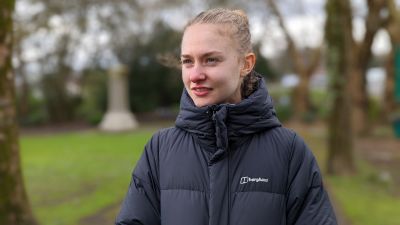Carmarthen woman living with anorexia calls for more training for doctors on eating disorders

A woman who had anorexia said her encounters with GPs have "not been filled with understanding and compassion" and is calling for more training and awareness.
As a youngster, Holly Rhys Ellis was admitted to an inpatient child and adolescent psychiatric unit in Cardiff with anorexia nervosa and given two weeks to live.
Holly's mother was very concerned as Holly was coming home from school and falling asleep because she was hardly eating.
Her mother rang the GP to see Holly as an emergency because she had no energy.
Holly, who is from Carmarthen, said: "I got to the surgery and the GP said that it was 'just a phase', seeing as I was only young, I would grow out of it, and I 'just needed to eat more.'
"I can't speak for all GPs but, unfortunately, the encounters I've had haven't been filled with understanding and compassion."
Over two-thirds of people with an eating disorder feel their GP did not understand how to help them with their illness, a survey has found.
The eating disorders charity Beat is calling for all medical schools to implement comprehensive training on eating disorders so all doctors are able to identify eating disorders and signpost patients to specialist support without delay.
While healthcare staff are working tirelessly to provide the best care for the 60,000 people in Wales affected by eating disorders, the average doctor receives less than two hours of eating disorder training during their medical degree, according to the charity.
A fifth of medical schools do not provide any training at all.
Holly said our primary clinicians need to be better equipped with the knowledge of how to correctly approach someone with an eating disorder.
The 26-year-old's condition has fluctuated throughout the last fifteen years.
She said: "It's been difficult but you get to a point where... you have a bit more confidence in knowing what to ask for.
"Initially, if I were to be diagnosed with anorexia, I'd find it incredibly difficult, but now, being armed with the knowledge and experience, I know what to do when I'm seeing the symptoms and the signs that I'm starting to struggle.
"I suppose I try to focus on the bigger picture, so whenever I feel like I'm being sucked into this vortex of eating disorder, I keep trying to ask myself, 'What do you want to do by the time that you're 80 years old. What do you want to have achieved?'
"And I like to think I'd have achieved a lot more than an eating disorder.
"And so I try to just keep that in mind and focus on bigger and better aspects of life, like travelling and spending time with family and friends."
The survey carried out by Beat revealed how people who have or previously had an eating disorder, felt about their experience with healthcare professionals:
Holly said she wants people to ask for help "whenever they feel something isn't quite right."
She said: "You know yourself better than anyone, and the people around you even better again, and so listen to them, and if they're concerned then do something about it.
"Don't wait for that moment where you're ill enough, because you're ill enough now."
Beat's national officer for Wales, Jo Whitfield said that accessing specialist treatment quickly leads to the best chance of making a full recovery.
She said, "We will be continuing to work with the Welsh Government, NHS and policymakers to ensure that people with eating disorders can always access the help that they need.
"Whilst some progress has been made, we found that the quality and availability of eating disorder services still heavily depends on the person's postcode."
"We continue to prioritise investment for these services"
The Welsh Government said since 2017 health boards have received an additional £4.1 million to support improvements such as early intervention and improved waiting times.
"Every health board has received funding to support the improvement of their eating disorder services and we continue to prioritise investment for these services.
“Eating disorders are a complex, high-risk area of practice that should be covered in every doctor’s education. The GMC has asked medical schools to develop a common approach to improve how eating disorders are taught at medical school.
“For those already qualified, clinical CPD resources for GPs have been developed to increase understanding and interest in the speciality, to assist with identifying the signs, assessing eating disorders and accessing appropriate referral pathways.”
What support is available?
Beat - People can get support in Welsh or English by calling the main helpline number 0808 801 0677